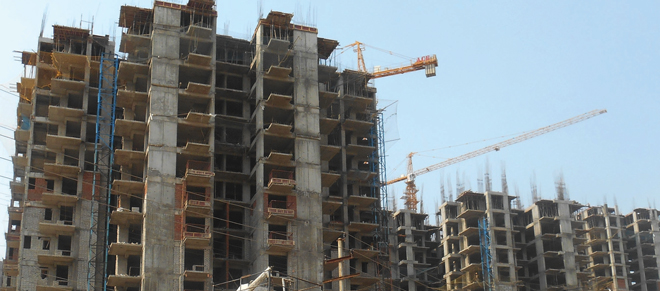Bytes
FINE INTENTIONS


After the Budget 2014-15 laid down the general direction and exhibited the new Government’s strong intent to revive the beleaguered real estate world, moves are taking place on the ground. Already a lot of expectation and cheer is being generated by the proposed dilution of the Land Act and expected expansion of the purview of the real estate regulatory authority. Such and similar moves can go a long way in bringing a spurt in development activity which will sharply uplift the sagging sentiment
Real estate’s ache din are not yet here but if certain signs of the Modi Government are taken as an indication, good times cannot be far away.
First, it was Finance Minister Arun Jaitley’s Union Budget 2014-15 which had quite a few goodies to offer to the sector. Then came reports about the Government’s plans to water down the Land Act to make it more industry-friendly. And in the corridors of power, there is now talk to expand the ambit of the Real Estate Regulatory Authority (RERA) to protect property buyers from getting duped by unscrupulous elements.
For the moment, therefore, the Budget and the proposed legislative changes have immensely strengthened the belief about the new Government’s serious intent to bolster realty in the country. Such developments, as and when they actually happen (which could be very soon), are bound to go a long way in boosting the sinking sentiments and would provide a big impetus to the realty sector.
LAND ACT
The Right to Fair Compensation and Transparency in Land Acquisition, Rehabilitation and Resettlement Act, or Land Act, as it is simply known as, came into force on January 1 this year replacing 119-year-old legislation. The Act was hailed as “historic” when it was passed by the previous UPA Government and the then-rural development minister Jairam Ramesh had allayed the fears of the industry that it would make projects economically unviable. Ramesh had said that the Act was “humane, its thrust is on rehabilitation and resettlement and in the national interest, as it promotes the welfare of tribals and marginal farmers”.
The industry, however, was not convinced with the Government’s arguments and found the law a huge impediment to the execution and implementation of megaprojects. The BJP, then in the opposition, did not oppose a populist law just before the last general elections but its manifesto did hint at a review. The revision of the Act has also now become imperative for the new Government to execute major industrial projects through the
public-private partnership (PPP) route as envisaged in Jaitley’s Budget.
In this backdrop, Union Rural Development Minister Nitin Gadkari organised a conference of revenue ministers of all state governments in New Delhi on June 27 wherein a consensus was arrived at to tweak various provisions of the Land Act to make the acquisition of land easier and faster.
To a certain extent, the Government was also pushed into having a relook at the Act as many states sought complete autonomy on issues of land acquisition, keeping the Centre at bay. The consensus report prepared after the Centre-states meeting has now been sent to the Prime Minister’s Office for its consideration. After the PM’s approval, an all-party meeting is likely to be called as early as possible. Once the political parties heading various state governments in the country give their nod, the Centre will be ready to amend the much-touted “landmark” Act in Parliament.
Union rural development minister Nitin Gadkari organised a conference of revenue minister, of all state governments in New Delhi on June 27 wherein a consensus was arrived at to tweak various provisions of the Land Act to make the acquisition of land easier and faster.
The consensus report prepared after the Centre-states meeting has now been sent to the PMO for its considerations. After the PM’s approval, an all-party meeting is likely to be called as early as possible.
The real estate sector is excited about the proposed expansion of RERA purview which when accomplished will instill more transparency, trust and credibility in their business.


RAVI SAUND, COO, CHD Developers


DAVID WALKER, Executive Director, SARE Homes
REAL ESTATE
REGULATORY AUTHORITY
Almost concurrently to Gadkari’s meeting on the Land Act, the Union Housing and Poverty Alleviation Ministry, based on the recommendations of the standing committee of Parliament, readied plans to expand the purview of the Real Estate Regulatory Authority (RERA) to protect property buyers from getting fleeced by agents and brokers. The committee has proposed making it mandatory for real estate agents to get registered with the proposed RERA and also to bring commercial real estate in its ambit. The RERA Bill, also moved by the previous UPA Government, was referred to the standing committee which sent its recommendations to the ministry in February this year.
Keeping its fingers crossed, the real estate sector is excited about the proposed expansion of RERA purview which when accomplished will instill more transparency, trust and credibility in their business. The mandatory registration of real estate agents with the regulator which may also get commercial estates under its ambit, would “help protect buyers’ interest from unscrupulous agents and property brokers”, according to an official of the Housing Ministry. The ministry is expected to formally approve the changes to the RERA Bill soon after which a Cabinet note would be moved.
The proposed dilution of the Land Act and expansion of RERA purview have sent cheer among the real estate developers, property buyers and other stakeholders. The changes are also sure to provide a massive boost to mega PPP projects stuck for long thereby dispelling the gloom in the overall economic sentiment.
•The consent clause should be removed from PPP projects Alternatively, consent requirements may be brought down to 50 percent, the ministry note said.
•The present low limits acquisition option only for wasteland and single-crop land. If the proposal is accepted, this will make 48 percent of the total 179 million hectares of total agricultural land available for acquisition. And, that should certainly be good news for developers across the country.
•The panel had wanted smaller real estate projects – coming up in plot sizes less than 1,000 sq meters – to be brought under the purview of RERA, but the recommendation didn’t find favour with the ministry.


PREETI KALRA, Associate Director, Baya Weaver Ltd
KEY PROPOSALS
Among the 19 amendments to the Land Acquisition Act proposed in the note sent by the Rural Development Ministry to the PMO, the most crucial is the proposal to “re-examine” the ‘consent clause’ which currently states that prior consent must be obtained from 70 per cent of the affected families if the land is being acquired for PPP projects and from 80 per cent in case of land for private projects. “The consent clause should be removed from PPP projects. Alternatively, consent requirement may be brought down to 50 per cent”, the ministry note said.
The report has also sought “re-examination” of the definition of “affected families” eligible for rehabilitation and resettlement benefits under the existing Act. The ministry proposal wants to exclude from the purview of the Act “livelihood losers” who have been working in the affected area for three years and whose primary source of livelihood is affected.
Significantly enough, the report has also recommended lifting of ban on acquisition of multi-crop land. The present law limits acquisition option only for wasteland and single-crop land. If the proposal is accepted, this will make 48 per cent of the total 179 million hectares of total agricultural land available for acquisition. And, that should certainly be good news for developers across the country.
The ministry’s other proposal to confine the mandatory Social Impact Assessment (SIA) study to only large or PPP projects “as it may delay the acquisition process” is bound to raise the hackles of many a social activist. Presently SIA is mandatory for all projects irrespective of their size and has to be completed within six months. Those favouring the clause have always maintained that SIA mainstreams evaluation of the cost-benefit equation by factoring in social and environmental variables. The critics, however, say SIA provisions are too elaborate and delay the projects and they will be too happy to see them buried.
Among the other key proposals forwarded by the ministry to the PMO is the modification of the controversial “retrospective clause” that stipulates that land acquisition process would be deemed to have lapsed if compensation is not paid or physical possession has not been taken. Besides causing “extreme burden” on the exchequer, the ministry is of the view that this clause leaves the door open for litigations. A related proposal to this is the one excluding the litigation period while calculating the prescribed time-limits for completing various proceedings under the Act.
A key proposal that takes care of the concern of various states is the one ensuring the powers to determine “any other emergency” under the urgency clause are also exercised by the state government. The Centre is well aware that many states feel that the present Act is an “infringement” upon their autonomy and some are even keen on having their own land acquisition policies.In any case, the Modi Government can ill afford to ignore the states’ demands as Samajwadi Party which has a government in Uttar Pradesh, AIADMK in Tamil Nadu, TMC in West Bengal and BJD in Odisha have a chunk of votes in the Upper House, where the BJP is in a minority. The Centre needs to carry them along for getting the Act amended.


SJ SINGH, CMD, Urbainia Spaces


KAMAL BATRA, Chairman, Buniyad Group
Besides the two proposed changes in RERA purview which the entire sector is sure to welcome, a third recommendation of the standing committee which has not been accepted by the ministry should come as a huge relief to small builders. The panel had wanted smaller real estate projects- coming up in plot sizes less than 1,000 sq metres- to be brought under the purview of RERA, but the recommendation didn’t find favour with the ministry. The change would have made it mandatory for small builders to provide a host of details to the regulator- including approved layout plan, timeline, cost and sale agreement that their prospective buyers will have to sign- before it would be allowed to advertise or launch the project.


Dubbing the difficulty in buying and acquiring land for new projects as the key reason for decline in economic growth rate during the last few years, Ravi Saund, COO of CHD Developers, welcomed the move to amend the Land Act. He said the law framed last year “had made it impossible for private players to venture in new projects as the conditions in the Bill were not conducive in acquiring land.”
Saund said: “The moves to reduce consent requirements as well as the relaxation of Social Impact Assessment for smaller projects among other provisions will bring down the time and cost delays”.
Saying his company is not affected directly by any of the proposals, Saund said: “Whatever projects we have undergone and the ones in pipeline, we have first and foremost acquired land and its clearances from the respective authorities . . . (but) the new law will definitely bring a heave of sigh from developers across the nation”. On the Real Estate Regulatory Bill, which the Union Cabinet approved after a long hiatus in June 2013, Saund said: “The licensing of real estate agents and brokers are a must to streamline the sector to help in organising the sector and avoid malpractices often undertaken by miscreant brokers to delude the consumers who are most vulnerable.”
According to David Walker, Executive Director, SARE Homes, the proposed measures to simplify rules and regulations regarding the Land Act “will give great confidence to investors and providers of capital, which is essential for India to achieve high growth.” He wanted the Government to also modify the retrospective clause for compensation. “Even the officials are of the view that the compensation should be calculated from the date of preliminary notification of acquisition, not from the date of the SIA, as stipulated in the Act”, he said. The move to reduce consent requirements, he said, “is a step which will act as a booster for the developer community”.
Walker also welcomed the proposal to bring agents/brokers under the purview of RERA. “Licensing would help as it would take away fly-by-night operators and people with a malicious intent or low understanding of the market and allow more credible people to operate”, he said.
Preeti Kalra, Associate Director, Baya Weaver Ltd, dubbed the proposed revision in the Land Act as a “much-needed evolution as it seeks to replace the antediluvian regulations with a fresh legislation”. She said: “Adequate and justified compensation in various forms, including rehabilitation and resettlement, is anticipated to ease and smoothen out some of the bottlenecks associated within the process.” However, she added, “All our projects are on land parcels that are fully paid and with clear titles. We practice this as a business philosophy so as to avoid any untoward proceedings in the future.”
Though she says it won’t be an easy task to carry out these changes, she is confident that the “Government will consider all suggestions and devise an appropriate path benefitting all the parties.” Kalra added the move to bring real estate agents/brokers under RERA purview “will enhance the credibility of the broker community and will pave the way to instill the faith of the buyers”.
Some of the other developers contacted by Realty & More also endorsed the government’s move to expand the ambit of RERA. SJ Singh, CMD, Urbainia Spaces, said: “With abundant incidents of property buyers getting duped by agents and brokers taking place in Indian real estate, it is important that the Government is planning to make it mandatory for all real estate agents to get themselves registered with RERA.”
Said Kamal Batra, chairman, Buniyad Group: “The execution of this Bill will greatly benefit the customers and also help in eradicating the fraudulent lot of brokers because of whom this sector is infamous”.
-



 Interviews4 weeks ago
Interviews4 weeks agoHigh Rental Yield, Price Appreciation, Stable Growth, Make Sydney an Ideal Realty Investment Option: Haansal Estate
-



 News3 weeks ago
News3 weeks agoKW Delhi 6 Mall Onboards New Brands
-



 News3 weeks ago
News3 weeks agoManasum Senior Living Launches IKIGAI GOA, A Senior Living Community in North Goa, in collaboration with Prescon Homes
-



 News2 weeks ago
News2 weeks agoGodrej Properties Sells Rs 3k cr+ Homes of Godrej Zenith, Gurugram, within 3 days
-



 News3 weeks ago
News3 weeks agoBridging India Divide: Top 5 Tier- 2 Cities to Focus On
-



 News3 weeks ago
News3 weeks agoCommercial Realty Gets Tech Savvy: Fast Construction, Enhanced Convenience
-



 News3 weeks ago
News3 weeks agoMultipoint Connection – A Definite Boon
-



 News2 weeks ago
News2 weeks agoRBI’s Status Quo on Key Policy Rates to Help Maintain the Real Estate Growth Momentum, Say Industry Stalwarts































